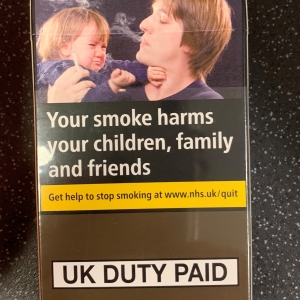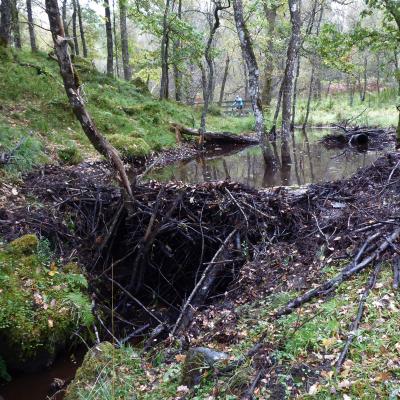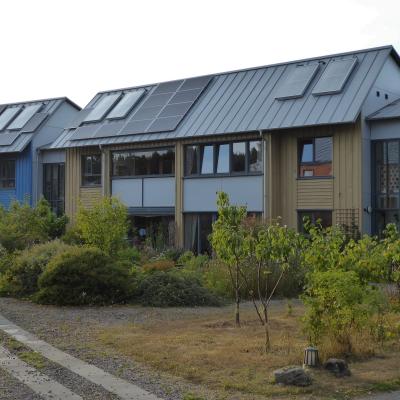In this article I outline how we have waged a 'war' against the harm caused by smoking over several decades and how this is a good analogy for how society should tackle our climate crisis. First published as an opinion piece in the Scotsman on 8 October 2021.
Like all addictions it is better not to start than to try and stop. But we can learn from how we have successfully tackled our addiction to nicotine.
A Burning Analogy?
Once you have caught lung cancer it is really rather late to quit smoking. Some damage has already been done. But it will lead to a less risky situation for your future.
Similarly, once the major consequences of climate change are here, we will not be able to reverse many of its affects such as the continued rise in sea level over centuries. However, reducing carbon emissions will always be better for the future climate than the alternative.
It is difficult to say when a smoker will cross the threshold of irreversible damage. It is equally impossible to say when the climate might tip into a new and catastrophic state. Clearly, in both cases it is sensible to be cautious and to act early to prevent future risks.
Setting yourself a target to quit smoking by 2040 won't do you any good. Similarly, governments, or companies setting long term targets will not solve our climate problem. It is too urgent. We need action now, preferably to stop emissions/ smoking; alternatively to reduce as much as possible, as early as possible.
The Warning Signs were there
In 1950 the first article was published in the British Medical Journal that linked smoking to lung cancer. Later, further links were made with bronchitis and coronary heart disease. By 1983 the impact of passive smoking was well known - so like emitting carbon dioxide, smoking harms you, the environment and other people. It can no longer all be about 'personal choice'.
The global annual death toll from tobacco use is 7 million and rising. On current trends tobacco will kill one billion people during the 21st century. It is hard to equate this to climate change as this will depend on how much carbon dioxide we emit, but clearly the economic, natural and human suffering from a shift in our climate will be enormous.
Pollution
A slight aside, but it is interesting to note the impact of smoking on the environment. Tobacco plants are grown as a monoculture requiring a lot of pesticides, fertiliser and herbicide. Tobacco is often grown on land that was previously forest and more wood is cut down to burn as fuel to dry the cut tobacco leaves. There is also considerable pollution and chemicals released from the manufacture of cigarettes. Then once used, cigarette butts are non biodegradable - 6 trillion butts are discarded each year - often direct into the environment leaving unsightly litter and leaching toxins into the soil and water. This bears many similarities to the pollution caused by our extraction of coal, oil and gas.
Peak Smoke
Tobacco companies offered UK and US servicemen free cigarettes during World War 2, and these were subsequently introduced to their regular rations. In the UK, smoking has declined from its post war peak of 82% of men in 1948. But smoking rates increased in women to a peak of 45% in 1965 driven by marketing campaigns aimed at empowering women to be 'independent'. There has been a slow but steady decline in smoking since 1974 when regular surveys began. The offer of free cigarettes is the ultimate in government subsidies, not dissimilar to the numerous subsidies and tax breaks that governments have, and still, provide to fossil fuels around the world.
Taxes
UK excise duty was introduced in 1976. Around 80% of the retail price of a packet of cigarettes is tax. This tax is justified to reduce smoking and to improve health outcomes. The tax raised can be spent on the heath care needs of smokers. A tobacco duty ‘escalator' was in place between 1993 and 2000 to bring in above inflation rises each year to reduce consumption. But, as always, there are loopholes, with the sale of duty free cigarettes still being advertised at international airports. Also, as taxes rise the global trade in illegal cigarettes has soared.
The UK Government introduced a 'fuel price' escalator in 1993 to 1999, then abandoned it after protests by lorry drivers. It is difficult for governments to increase carbon taxes to the level required to radically reduce consumption given that people need to travel, heat their homes and use electricity. So, carbon taxes should be raised, but there are limits to what society will accept without street protests. Governments need to regulate too.
Regulations
There has been a slow tightening of the screw on the advertising and marketing of cigarettes in the UK from 1965 onwards, culminating in the ban on smoking in enclosed public spaces in 2007 (2006 in Scotland).
1965: Ban on cigarette advertising on television
1971: Health warnings on all cigarette packets sold
1984: Smoking ban on London Underground trains
1986: Ban on tobacco advertising in cinemas
2002: Complete ban on tobacco advertising in line with an EU Directive
In parallel to these marketing restrictions, ever tighter restrictions on sale have been introduced, including a ban on sale to children under 18. In the UK all cigarettes are now sold 'under the counter' to prevent 'impulse buys' and to make it more difficult for children to buy them. Every packet of cigarettes sold now includes graphic health warnings.
Unlike smoking, there are few marketing restrictions on the sale of coal, oil or gas. Perhaps there should be. I heard of one suggestion to publish 'health warnings' on petrol pumps to remind drivers that they are buying a product that is damaging the environment. I'd certainly like to see compulsory carbon footprint labels on all common products sold by supermarkets. This would guide consumers towards purchases that are healthier and better for the environment.
Because fossil fuels are so integral to our society and lifestyles we can't sensibly ban or give up burning all fossil fuels today. We need to provide alternatives and plan for the change ahead. A good example is the UK Government announcing a ban on the sale of new petrol and diesel cars from 2030. We also need to plan a phase out of boilers that burn natural gas in new homes then in existing homes. This provides industry time to prepare and to innovate if necessary.
Innovation
Manufacturers have introduced lower tar cigarettes and e-cigarettes (vaping) to increase their market share with 'healthier' alternatives. In the climate battle, innovation is absolutely vital. Innovation has already brought down the cost of renewable energy and energy storage which is paving the way for the widespread adoption of electric cars.
Legal battles
Around the world, but particularly in the USA, smokers and their families have taken tobacco companies to court for selling harmful products. This culminated in 1997 with US tobacco firms agreeing a multi-billion-dollar settlement to cover healthcare costs incurred to treat people with smoking-related illnesses.
Some climate activists are now attempting to take governments to court arguing that they are not safeguarding their citizens, and taking oil companies to court arguing for a pro-rata proportion of damages caused by climate change. There will be long, but interesting, court battles ahead.
Public Campaigns
For decades the government has run public campaigns to educate and motivate people to quit smoking. This has been backed by the health service offering alternatives such as nicotine patches.
In the UK all school children are now taught about climate change although more could be done to cover wider issues such as biodiversity loss. However, most adults and those in authority have never been taught about climate change. Their knowledge is from books, friends, newspapers and even worse from social media. A campaign to educate adults in workplaces and night classes is needed.
The Fight back
Of course the campaigners against smoking haven't had it all their own way. The tobacco companies have fought against regulations, or argued to delay or water them down. One tactic employed by industry associations is to agree 'voluntary codes of conduct' which of course are never very strict and are hard to enforce. Overall, whilst smoking in developed countries is declining, tobacco companies are now focusing their efforts in certain developing countries such as in Africa to create new generations of young people addicted to nicotine.
The oil companies act in a similar way, giving ground where they have to, but campaigning against the science or casting doubt on the science. More recently they have changed tactics to campaign for gradual change or agreeing that change is necessary, but not now. Somehow, magically, their proposals to extract more oil or gas are ‘less bad’ than those of their competitors!
Conclusion
Whilst not exact, there are many similarities between the efforts to reduce smoking and to cut our carbon emissions. After a slow start, a tipping point was reached, when it became culturally unacceptable to smoke in public places. We need the same decade’s long campaign to wean us off our current addiction to burning coal, oil and gas. Soon it will be frowned upon to drive an internal combustion engine car, to eat beef and dairy or to fly on holiday without robust carbon offsetting. Your grandchildren will not understand why you did not act earlier.
Carbon Choices
If you have enjoyed this blog, please share with others on social media. You might also enjoy Carbon Choices on the common-sense solutions to our climate and nature crises. Available direct from me or from Amazon. I am donating one third of profits to rewilding projects. I am also available to give presentations on 'rewilding' or on the 'common-sense solutions to our climate crisis'.









